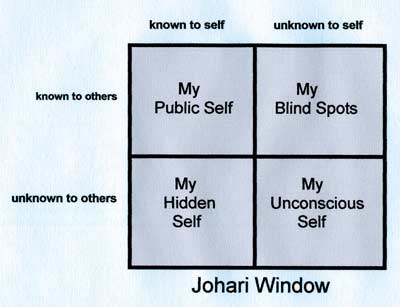This past week, I played golf with a woman I didn’t know very well. We were polite to each other, exchanging the usual pleasantries, but initially, there lacked a certain camaraderie that makes playing alongside someone else all the more pleasant.
As we worked our way through the course, I learned more about my playing partner and she learned more about me. Our picture of each other grew with each new revelation as we compared opinions, attitudes and experiences. And, as we walked off the eighteenth green, we were laughing about many of life’s ironies. The game itself was of little consequence. Neither of us scored that well (which gave us something else in common) but we walked off the course with much more than we had when we first began, a better understanding of one another.
This experience put me in mind of the Johari Window. Here is a little of the history of this very useful model.
Here’s what it looks like:

Here’s roughly how it works:
The first pane of the window represents Public Knowledge. This is where thoughts and feelings have already been openly expressed. It’s stuff about us that everybody knows. For instance, I have brown hair, (well most of the time anyway).
 The second pane shows our Blind spots, you know, the things that others see in us that we don’t. Someone once told me that he saw me as aloof. This kind of took me by surprise because it wasn’t how I saw myself at all. When I looked at this information more closely though, I began to realize how he might have gained that impression. And that was useful.
The second pane shows our Blind spots, you know, the things that others see in us that we don’t. Someone once told me that he saw me as aloof. This kind of took me by surprise because it wasn’t how I saw myself at all. When I looked at this information more closely though, I began to realize how he might have gained that impression. And that was useful.
The third pane is characterized by Secrets. This is knowledge that we have about ourselves that we have not shared with others. For instance I… Oh never mind.
The final pane of the window is the area reserved for the Unknown, the stuff we don’t know that we don’t know.
The goal of the Johari Window is to help us consciously decrease the number of blind spots and secrets and increase the area of public knowledge in service of building relationships.
In the case of me and my new golf buddy, it could be said that when we started our game, the area of Public knowledge was quite small; the area of blind spots and secrets was quite large. By the end of the game Public knowledge had increased as we shared information about each other and Secrets became smaller.
For me, the Johari Window gives us an opportunity to understand each other and to build trusting relationships. The more we disclose about ourselves the more accessible we become. And, as leaders, it is vital to be accessible, open to new ideas and willing to share information about ourselves. This creates an environment that encourages an exchange of authentic information. And, if you are working together toward a common goal, that’s important, don’t you think?



This is a really useful and interesting model. Seems to me a key point is that you saw your blind spots because you were open to seeing them. It can be easy to unconsciously close ourselves down when we don’t have that immediate connection with someone. You could have just gotten through the round waiting for it to end. Instead you opened yourself up and allowed a relationship to emerge.
Thanks Susan. I think you’re right a key ingredient in all of this is willingness. Without that, you can have as many “models” as you like and it wouldn’t make any difference.
I really like this model, but then I really like the “four boxes” model for a lot of things. 🙂
Seriously, being able to assess your position with someone with such an easy and accessible model is really helpful. In this world of easy virtual interaction, what ends up in each of these boxes is very different from what we might have found there ten years ago. In particular, the transition from “hidden self” to “public self” seems to be happening more frequently these days through intentional and inadvertent posts to sites like Facebook and Twitter.
Hi Chuck,
You make a good point! Our ability to access information about each other through applications like Twitter and Facebook is indeed much greater than it was ten years ago. And it does make it easier for us to “open up” sooner.
Is it because we trust sooner or simple that we have the facility to retreat faster I wonder? 🙂
Thanks for coming by!